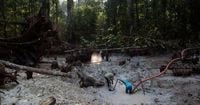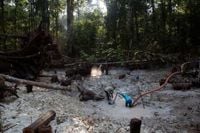In a sweeping crackdown that spanned nine Latin American countries, Interpol has announced the arrest of 225 individuals for environmental crimes, following a two-month multinational police operation that took place in May and June 2025. The results, revealed on October 24, 2025, mark a significant escalation in the fight against illegal logging, wildlife trafficking, and gold mining—activities that have long plagued the region’s fragile ecosystems and fueled organized crime.
The operation, codenamed Operation Madre Tierra VII, was coordinated by Interpol’s bureau for Central America and supported by its environmental security unit. According to the Associated Press, the operation uncovered more than 400 cases of environmental crimes, including 203 forestry-related offenses and 138 linked to the illegal wildlife trade. The scale and scope of the crackdown highlight both the persistence of environmental crime networks and the growing determination of international law enforcement to disrupt them.
Interpol’s efforts were not confined to a single type of offense. The operation targeted a range of criminal activities: illegal logging, wildlife trafficking, fishing violations, illegal mining, and pollution. The contraband seized paints a vivid picture of the illicit trade’s diversity and reach. Authorities confiscated live birds, reptiles, turtles, primates, and big cats, alongside 2.4 tons of shark and ray fins. There was also the seizure of 875 kilograms—almost 1,930 pounds—of totoaba, a critically endangered fish, and 7 kilograms (15 pounds) of dried sea cucumber. These items are coveted in international markets, often fetching high prices and driving the relentless exploitation of protected species.
But the operation’s findings go far beyond the animals and plants themselves. Investigators identified deforestation hotspots spanning more than 50,000 hectares (193 square miles), many of which were linked to organized criminal groups operating across continents. According to Interpol, the crackdown also exposed transnational routes that stretched as far as Europe and Asia, underscoring how environmental crime is increasingly driven by sophisticated, globalized networks.
Timber trafficking was another key focus. Large quantities of illegally harvested wood, including pine, oak, and high-value cedarwood and rosewood, were confiscated. Rosewood, in particular, can fetch up to $6,000 per cubic meter on the black market, a figure that underscores the immense profits fueling forest destruction in the region. The operation also led to the seizure of weapons, vehicles, boats, and communication equipment, further demonstrating the criminal sophistication behind these environmental offenses.
One of the most disturbing cases emerged in Panama, where authorities uncovered a large-scale illegal gold mining operation involving child labor, human trafficking, and mercury contamination of rivers and soil. The environmental and human costs of such activities are staggering, with mercury pollution posing a serious threat to local communities and biodiversity. The case illustrates the intersection of environmental crime with other forms of organized criminal activity, creating a toxic mix of exploitation and violence.
Oscar Soria, chief executive of The Common Initiative, an environmental think tank, told the Associated Press that the operation demonstrates how environmental crime in Latin America "has become deeply integrated with traditional organized crime networks," as drug-trafficking groups expand into illegal mining, logging, and wildlife smuggling. "These low-risk, high-profit crimes now provide financing for armed groups and thrive on corruption at multiple levels," Soria said. "What’s urgently needed is a structural response—not just arrests, but stronger governance, better regional coordination and efforts to reclaim territories where criminal networks fill the void left by the state."
Operation Madre Tierra VII was part of Project GAIA, a broader initiative backed by Germany’s Environment Ministry. Police forces from countries including Colombia, Mexico, and Costa Rica played key roles in the coordinated effort, working alongside Interpol to share intelligence and coordinate cross-border investigations. The operation’s success builds on previous cross-border crackdowns, such as one along the Paraguay-Brazil-Argentina border that resulted in 26 arrests for illegal timber trafficking. These efforts underscore a growing recognition that environmental crime cannot be tackled by any one nation alone; it requires sustained, multinational cooperation.
Despite the impressive number of arrests and seizures, authorities caution that much work remains to be done. Hundreds of new investigations have been launched as a result of the operation, targeting the networks and individuals behind illegal logging, wildlife trafficking, and gold mining. A final analytical report on the operation’s findings is expected to be presented in late November 2025, providing further insight into the scope of the problem and the effectiveness of law enforcement strategies.
The economic incentives driving environmental crime are formidable. The black market for protected species and timber is vast, with demand coming from as far away as Europe and Asia. This demand creates what Interpol describes as trans-continental commodity chains, turning forests and endangered species into sources of illicit profit for organized crime. The consequences are profound: not only do these activities threaten biodiversity and climate resilience, but they also undermine the rule of law and fuel corruption and violence.
According to Interpol, the seizures made during Operation Madre Tierra VII highlight the ongoing exploitation of protected species for lucrative international markets. The operation’s results underscore how organized criminal networks are turning protected species and forests into commodities, with profound consequences for ecosystems and climate resilience. The identification of deforestation hotspots and the exposure of transnational smuggling routes reveal just how deeply entrenched these criminal enterprises have become.
For local communities, the impact of environmental crime is often immediate and devastating. Illegal mining and logging can destroy livelihoods, contaminate water supplies, and drive displacement. The use of child labor and human trafficking in some operations, such as the case uncovered in Panama, adds a grim human dimension to the environmental toll. Efforts to combat these crimes must therefore address not only the environmental impacts but also the social and economic vulnerabilities that allow organized crime to flourish.
Looking ahead, environmental advocates and law enforcement officials alike stress the need for a more comprehensive response. As Oscar Soria noted, arrests alone are not enough. "What’s urgently needed is a structural response—not just arrests, but stronger governance, better regional coordination and efforts to reclaim territories where criminal networks fill the void left by the state." The hope is that by shining a spotlight on these crimes and building stronger international partnerships, future operations can disrupt the networks driving environmental destruction and help restore the rule of law in some of Latin America’s most vulnerable regions.
As the world awaits the final report on Operation Madre Tierra VII, one thing is clear: the fight against environmental crime is far from over. But with growing cooperation and determination, there is renewed hope that the tide may finally be turning against those who profit from nature’s destruction.


